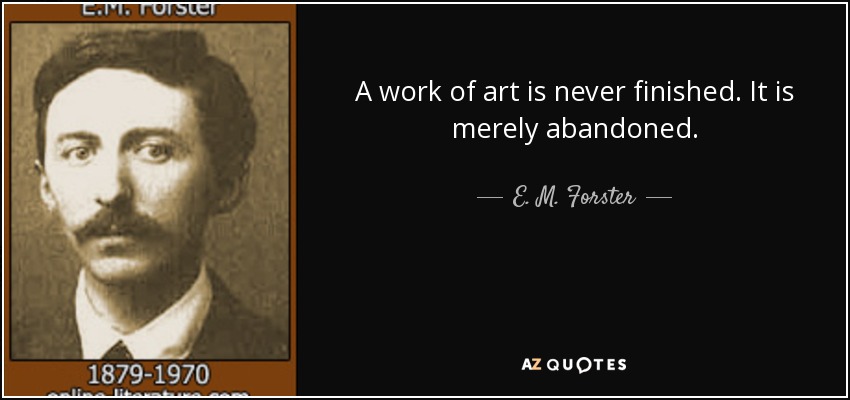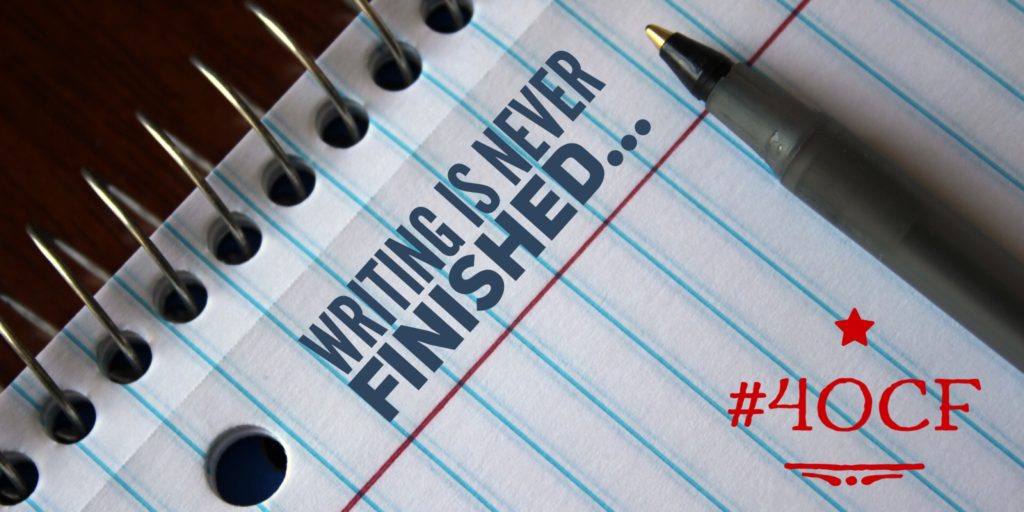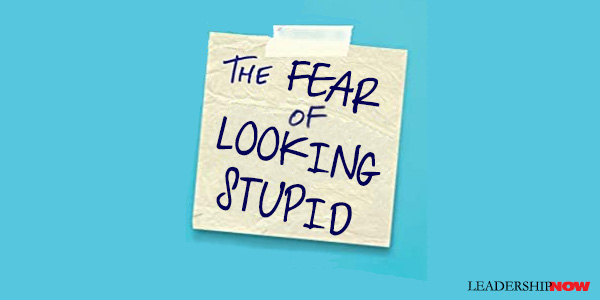A Sense of Doubt blog post #2066 - "Writing is never done, it's just due"
There's a corollary: "Writing is never finished; it is merely abandoned."
So for Writing Wednesday today I gathered some of these writings and memes for both that exist on the Internet as a resource for writers.
Enjoy.



https://fouroclockfaculty.com/2016/11/writing-is-never-finished/
Writing is never finished…
When I was in the classroom, writing seemed easier to teach. Granted, I wasn’t a writing teacher, but I did help students write in the context of science and social studies. Back then, a different approach was used, with all students writing from the same prompt. The final pieces would be slightly different from each other although there were usually plenty of similarities. The focus was more on the writing than the writer.
Let me share an example. I can remember any number of classes writing to a particular prompt right around Thanksgiving. Each student would write from the perspective of a Turkey, noting the reasons why he or she should be pardoned and not eaten on Thanksgiving. While the goal was humor, I can remember several of my colleagues being fatigued after trying to “grade” more than five of these at a time.
It was relatively easy to teach students to have an opening and closing sentence, a couple of metaphors, as well as correct capitalization and punctuation. By the end of the year, the majority of students could write a pretty decent paragraph. But the question remained, were they good writers?
Times have changed. Knowing what I know now, I recognize that writing instruction should have looked different. Now, we focus on the writer, which means that our instruction is never truly done. The writer always has room to improve. While a writer may finish a particular piece of writing, and be satisfied with publishing, he or she always has the opportunity to improve as a writer.
Several years back, I had the opportunity to see Kelly Gallagher speak. If you have not checked out Kelly’s books on reading and writing, you really should. Kelly said something that day that has stuck with me all these years:
“Writing is never done, it is just due.”
As I have learned, writing is not an easy task. It is a complex art form, and writing instruction should not simply seek students who can regurgitate simple writing pieces. Instead, we must focus on writers. We must help students to improve and grow as writers, to give them opportunities for authentic writing. Good writing teachers realize this. They are able to model their own writing process for students, showing them what it looks like to write for a purpose, showing them what it looks like when a writer gets stuck, and showing them how to improve as a writer.
Commit to improving writing instruction. Even if you do not teach writing directly, some of the most important skills we can help students improve are their writing skills. Focus on helping writers to improve.
After all writing is never finished.
Rich (@RACzyz)
https://www.writing.ie/guest-blogs/a-book-is-never-finished-only-abandoned/
“Graham Greene [said] “The writer is doomed to live in an atmosphere of perpetual failure.” There it is … every writer writes with the knowledge that nothing he writes is as good as it could be. Paul Valery said, “A poem’s never finished, only abandoned.” The same thing with a novel. It’s never finished, only abandoned. I’ve had any number of novels where I’ve just at some point said to myself, well, unless you’re going to make the career out of this book – spend the rest of your goddamn life chewing on it – you might as well just package it up and send it on to New York. Go on to something else. Because between conception and execution there is a void, an abyss, that inevitably f**ks up the conception. The conception never gets translated to the page. It just doesn’t. I don’t think it ever does.”
– Harry Crews
I’ve printed this rather long quote in full because I think it’s a fascinating point. A written work is never finished, only abandoned. (Of course, I say “written work” but this could equally apply to a painting or a song or a movie.) If we take this to be the case, then perhaps we should merely accept this. Maybe we shouldn’t care what’s not finished or what’s not quite right yet. Maybe we should just leave it there and move on. We can belabour the point and spend too much time thinking about the one thing and you’re never going to get it right.
Theodor W. Adorno, a German philosopher, once said, “The finished work is, in our times and climate of anguish, a lie.” And this ties in with something I’ve talked about quite a bit lately – the idea that everything is fragmentary. Our society is fragmentary, the works we write are fragmentary, and perhaps that’s why we feel that a work is never truly finished. Because, unlike the modernists, who believed that everything – both in life and in fiction –had some overarching narrative, we realize we’re living in these fragmented times. There is no overarching narrative to our lives, only a series of fragmented and sometimes contradictory events. And this is reflected in our writing and our other forms of art.
The Modernist’s “overarching narrative arcs” meant they were secure in their view of the world and their place in it. That is no longer the case. We live in an age of information overload. As soon as we make up our minds about one piece of information, another view comes along to challenge it. Nothing can ever be tied up in a neat bow. And neither can our writing.
https://goinswriter.com/art-is-never-finished/
Art Is Never Finished
Art is never finished, only abandoned.
—Leonard da Vinci
You can always go back and touch up a painting. You can always rewrite a lyric or melody. You can always edit a book or blog post. Art is never done. It is never complete. It can always be refined.

Maybe the tools we use to express our ideas are insufficient. Maybe our hands and brushes and laptops are crude instruments compared to the complexities of our souls and imaginations. So when we step up to our “canvases,” we end approach an inherently flawed medium in comparison to the genius inside of us.
As a result, the project always feels incomplete. It could always use another refinement or edit. It never feels “just right.”
I struggle with this feeling all the time, when it comes to creative projects (including this blog). I’m always wanting to tweak an element here or rewrite a word there. I’m never satisfied.
Or maybe ideas are, by their very nature, transient. Maybe they are always changing. Maybe art is constantly evolving, and therefore, the artist must continuously change how he expresses what the Muse is inspiring.
Maybe creativity is the act of embracing perennially unfinished work.
Maybe an artist is someone who starts, anyway. Realizing that the art will never truly be done, they choose to be courageous, to create.
Maybe that’s why so many people abandon creative work and why so few begin in the first place. Because art feels futile at times, but is, in fact, incredibly brave.
Do you think art is ever finished? Share in the comments.
*Thanks to Stephen Brewster for inspiring this post over a cup of coffee.
Post-script: Since posting this a few minutes ago, I’ve already edited and tweaked five six things.
https://medium.com/@austincoleschafer/art-is-never-finished-only-abandoned-86657a05c16b
Art is never finished only abandoned.
It should empower us to put a pen to paper or a brush to canvas, knowing we’re the greatest we’ve ever been… while at the same time recognizing that “perfection” (if there is such a word) is still worlds away from us.
As a writer, I will also tell you that this concept of art being abandoned can be taken more literally, too.
Very rarely do creatives put out work that feels finished; truly finished.
Take The Mona Lisa for example… eventually, Da Vinci had to decide to take his brush off the canvas and abandon the painting entirely.
So, I would even go so far as to say that while much of creating brilliant art is having the courage to try and risk making something bad… it’s also about knowing when you’ve made something good and recognizing it’s time to walk away.
https://patthomson.net/2015/11/02/the-writing-is-never-done-a-thought-for-acwrimo/
the writing is never done – a post for #acwrimo
Early career academics may well need to talk over what they can control and choose to do with a writing mentor. There is also valuable support and encouragement through peer writing groups and writing retreats and workshops. And let’s not forget sharing academic writing experiences online, through #acwri, #acwrimo and #ecr chat and other self organised groups. It’s not necessary to choose and sustain academic writing regimes in isolation.
Secondly and most importantly I/you have to learn to live with the writing never being over and done with, but always being writings – plural – in progress. And my best advice is not to be like me! I do have to confess that some years I have chosen to take on much too much. Like this year. Far too much indeed. But this year’s writing list was my decision. Nobody forced me to write as much as I am. And my problem this year is not an habituated view that the writing is never done, the problem is me wanting to write too much.
 |
| https://thewritepractice.com/hemingway-quotes/ |
+++++++++++++++++++++++++++++++++++++++++++++++++++++++++++++++++++++++
+++++++++++++++++++++++++++++++++++++++++++++++++++++++++++++++++++++++
+++++++++++++++++++++++++++++++++++++++++++++++++++++++++++++++++++++++
- Bloggery committed by chris tower - 2010.14 - 10:10
- Days ago = 1930 days ago
- New note - On 1807.06, I ceased daily transmission of my Hey Mom feature after three years of daily conversations. I plan to continue Hey Mom posts at least twice per week but will continue to post the days since ("Days Ago") count on my blog each day. The blog entry numbering in the title has changed to reflect total Sense of Doubt posts since I began the blog on 0705.04, which include Hey Mom posts, Daily Bowie posts, and Sense of Doubt posts. Hey Mom posts will still be numbered sequentially. New Hey Mom posts will use the same format as all the other Hey Mom posts; all other posts will feature this format seen here.







No comments:
Post a Comment